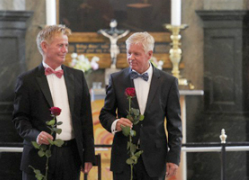
This month, France’s and Britain’s Parliaments are voting on same-sex marriage laws that will re-define the institution of marriage. France’s Socialist party voted to define marriage as an agreement between two people of the same or opposite sex. Although the proposed laws are currently met with opposition from many conservative parties, both countries are poised to legally recognize same-sex marriage, with the French National Assembly expecting to pass the measure on Febraury 12th. Britain is expected to follow the footsteps of France shortly thereafter, as evidenced by overwhelming support for the measure from the British House of Commons during a February 5th vote. The world-wide attention surrounding this hot-button issue emphasizes the building anticipation for the United States Supreme Court’s hearing of Hollingsworth v. Perry and U.S v. Windsor, both controversial same-sex marriage cases scheduled for oral argument in late March.
In 2001, The Netherlands became the first country in the world to legally recognize same-sex marriage, gaining tremendous support from the Dutch Parliament in a 107-33 vote. Several countries followed suit shortly after, including Belgium, Spain, Canada, Sweden, South Africa and Norway. To date, around a dozen countries legally support same-sex marriage. Most recently, last June, Denmark supported a gender neutral bill allowing gay marriages through church weddings or civil registry; although, Denmark was the first nation to legalize same-sex unions in 1989. Nepal is also on course to legalize same-sex marriage.
While many nations still do not permit same-sex individuals to marry, and some still even criminalize same-sex relations, there is a mounting trend globally towards ending marriage inequality. Evan Wolfson, Founder and President of Freedom to Marry, stated: “With France, England and Wales poised to become the next countries to embrace the freedom to marry, it’s clear that the momentum we see here in the United States for ending marriage discrimination is, in fact, a global movement toward greater freedom.” Furthermore, the United Sates “cannot afford to fall behind its closest allies and trade partners in this global economy.”
President Obama’s statements last May supporting gay marriage, in which he recognized “the fact that – for a lot of people – the word marriage is something that provokes very powerful traditions and religious beliefs, ” had hugely significant political effects. President Obama reinforced his position by becoming the first President to address gay marriage rights in his inauguration speech. While some states have passed freedom to marry laws, the U.S. Supreme Court’s decisions in the upcoming cases, which address both the constitutionality of the Defense of Marriage Act and California’s same-sex marriage ban, will shed light on the momentum of gay marriage rights at the federal level.
The global landscape of marriage equality has gradually shifted since the beginning of the 21st Century. With the anticipated addition of both France and Britain to the ranks of those countries that legally support gay marriage, more pressure is placed on United States to end marriage discrimination.
Lydia Rice is a 2L and a Staff Editor on the Denver Journal of International Law and Policy

